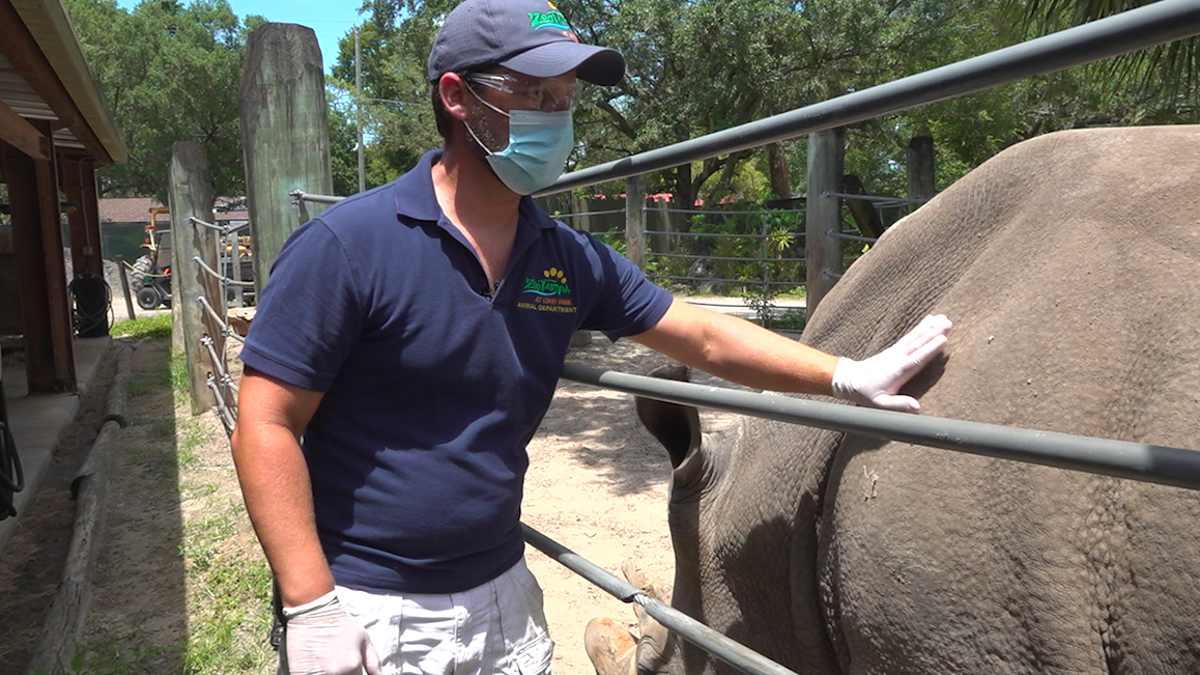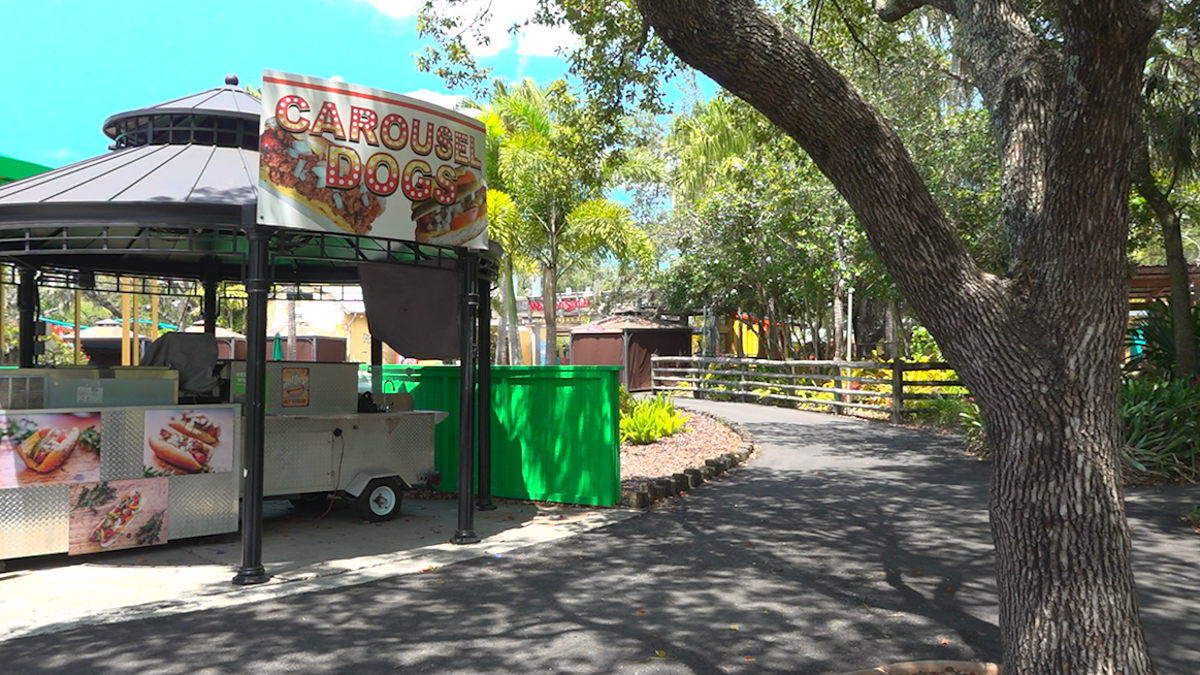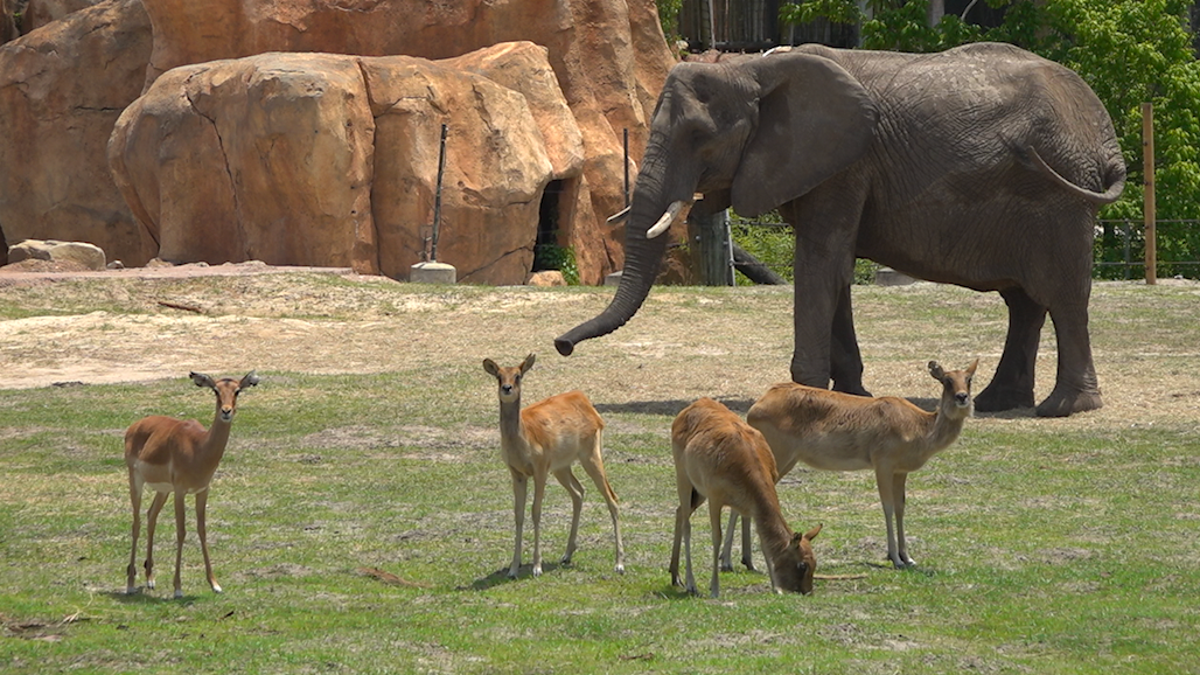Zoos struggle with animal care costs amid coronavirus closures
Zoos around the country remain closed because of the coronavirus outbreak, but their massive overhead expenses still remain.
TAMPA, Fla. — Life goes on for the animals at ZooTampa at Lowry Park.
The chirping of birds sounds across the sky. Giraffes and elephants roam the manmade savannah planes. And the penguins and manatees splash freely in their watery habitats.
All of this is keeping Chris Massaro, a general curator at the zoo, as busy as ever.

Chris Massaro, General Curator at ZooTampa, tends to a rhinoceros (Robert Sherman, Fox News).
“We have about 1,100 animals,” Massaro told Fox News. “It’s a lot of work every day but it’s more than worth it.”
That action is happening behind the scenes. But, in the public spaces, it’s a completely different story. The Zoo has been closed to guests since March 16 due to the coronavirus outbreak.
RELATED: ZOO SAYS CORONAVIRUS MAY FORCE IT TO FEED ANIMALS TO EACH OTHER
“It’s really quiet,” acknowledged Massaro. “But even without the guests here, we still have to be 100 percent functional on the other side of the fence. We still have to have a full team here, supplying the animals with everything they need.”
That includes feeding and tending to the animals, maintaining the facilities, and employing staff to do so.
ZooTampa is 93 percent self-funded, which means that the vast majority of its revenue comes from guests entering the park.

Normally hustling and bustling, ZooTampa is currently closed to the public because of the coronavirus outbreak (Robert Sherman, Fox News).
Joe Couceiro, President and CEO of ZooTampa, says the loss of revenue combined with the ever-present expenses has been a challenge.
“We can’t just simply leave the keys in the mailbox and take off and go home and shelter in place,” Couceiro told Fox News. “It’s impacted us tremendously. Being closed to the public puts us in a very difficult position because we don’t have that revenue coming in.”
Couceiro says the March closure came in the midst of their busiest time of the year. They were able to reduce their expenses by 60 percent, but Couceiro says ZooTampa still has a burn rate of more than $1 million a month.
Dan Ashe, CEO of the Association of Zoos and Aquariums, says just about all of the over 200 zoos his organization works with are facing the same problem.
CLICK HERE FOR COMPLETE CORONAVIRUS COVERAGE
“The effect really is devastating,” Ashe told Fox News. “All of the big pillars in their business models are at a standstill.”
Ashe says that the impact of the coronavirus has his team greatly worried. He disclosed that they're already “heat mapping” zoos that they think will be hit the hardest.
“We’re approaching a tipping point. I think many [zoos] can get to June or maybe through June,” said Ashe. “If they can be open by June then I think they’ll probably be able to recover — it will take a while, but I think they’ll be able to recover.”
“If we go past June, and they aren’t able to get into a position where they can generate significant revenue, I think we’ll have a significant crisis on our hands with a number of our institutions.”

ZooTampa is home to about 1,100 animals (Robert Sherman, Fox News).
As a result, Ashe encourages the public to visit nearby zoos when it is safe to do so, and to help any way possible.
RELATED: BRONX ZOO TIGER TESTS POSITIVE FOR CORONAVIRUS, OFFICIALS SAY
But there is some good news: a few zoos are already starting to reopen.
Utah’s Hogle Zoo in Salt Lake City reopened earlier this month to a limited attendance, and Ashe expects a few more to follow suit by the end of the month.
ZooTampa has set a target reopening date of June 1, when they intend to operate at 50 percent of comfortable capacity and use thermal cameras to detect guests who may be entering the park with a fever.
Other zoos that remain shuttered are getting creative to bring in revenue. The Denver Zoo held a rhino calf naming contest that generated about $40,000. The Cincinnati Zoo has been hosting “home safaris” that have brought in more than 8,000 donations -- totaling more than $217,000.
Phoenix Zoo is bringing in revenue by allowing residents to “cruise the zoo” from the comfort of their own vehicles.
Brevard Zoo in Florida brought in $100,000 from a giving campaign, which officials there say is enough to feed their animals for five months.
Couceiro says his team has been resilient amid unprecedented challenges and is looking forward to the opportunity to share their animals with guests again.
One aspect of the closure that pains him, aside from the finances, is that the zoo cannot fulfill its mission of educating people while closed.
CLICK HERE TO GET THE FOX NEWS APP
“There’s no purpose for us to be here if we’re not educating people,” said Couceiro. “[People] wake up in the morning, wake up their kids and they want to go to the zoo to be entertained. And that’s fine, we’re going to entertain them.
“But, when we entertain them, we’re going to engage them. When we engage them, we’re going to educate them. When we educate them, we’re going to inspire them. And when we inspire them, we create advocates and future zoologists. That’s why we’re here. That’s what we do every single day.”










































